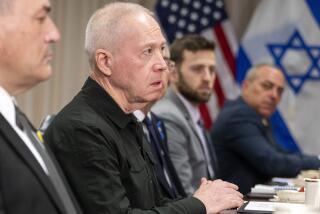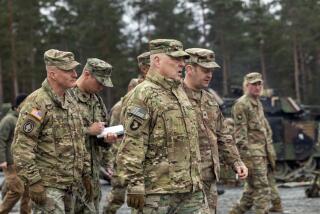U.S. Commanders, in Iraq, Discuss Military Strategy
- Share via
BAGHDAD — The United States’ top military commanders converged here Sunday to craft a strategy for using the momentum from a seemingly successful anti-insurgent battle in Fallouja to pacify other embattled Iraqi cities, pressing toward a decisive “tipping point” in the war.
In an unusually high-profile mid-battle gathering, Gen. Richard B. Myers, chairman of the Joint Chiefs of Staff, arrived from Washington, and Central Command chief Gen. John P. Abizaid flew in from his regional headquarters in Qatar. They met with the top U.S. ground commander in Iraq, Gen. George W. Casey, his Iraqi counterparts and the American generals in charge of Iraq’s various regions.
Unlike Myers’ occasional visits to troops in Iraq, the general planned this tour to discuss war strategy with senior commanders regarding the ongoing battle in Fallouja and the outbreaks of unrest in other areas, including Baghdad and the northern city of Mosul.
As many as 1,600 insurgents in Fallouja were killed so rapidly that the streets were littered with an “alarming” number of bodies, senior defense officials said, despite Muslim strictures that require burial within 24 hours.
The American commanders expect to use information gleaned from the dead and from interrogations of an estimated 1,000 captured rebels to find insurgent leaders -- possibly including the best-known guerrilla, Jordanian militant Abu Musab Zarqawi -- who the commanders said left Fallouja ahead of the last week’s fighting.
“I think Fallouja will show us where the leadership is,” Abizaid said. “I think there are quite a few people that are in our hands right now that will tell us an awful lot about their organization.”
Yet uprisings in Mosul and elsewhere suggested that many insurgents had fled Fallouja to fight elsewhere.
“The insurgency is like water, and when you squeeze it, it kind of goes like water,” Abizaid added.
The gathering, which commanders described as the result of visits independently scheduled before the latest confrontation in Fallouja, was marked by a renewed optimism among Pentagon strategists that they were making progress despite a recent rise in attacks by a stubborn insurgency.
“You never know how close you are to a tipping point,” said a senior defense official involved in the talks, who requested anonymity.
U.S. and Iraqi military commanders are setting their sights on a smaller hotbed of insurgency, Ramadi, as the next likely focus of a major anti-insurgent onslaught. The effort to seize control there is expected to be smaller than the 10,000 American and 2,000 Iraqi troops used in nearby Fallouja.
Iraqi and U.S. officials continued to express optimism over the prospect of nationwide elections for a new Iraqi government in January, but said that they depended on driving insurgents from Fallouja and Ramadi, the capital of Al Anbar province.
The province is considered particularly crucial because Al Anbar is predominantly Sunni Muslim. Authorities hope that Sunnis -- who were loyal to ousted President Saddam Hussein, a fellow Sunni, and have since supported and fought in the insurgency -- could be placated by participating in a new government.
Sunnis also could counterbalance Iraq’s majority Shiite Muslims, who Bush administration officials fear could use their power at the ballot box to steer the historically secular nation toward an Iranian-style theocracy.
Those election goals have not been derailed by what administration and Iraqi officials have criticized as a too-small United Nations contingent on the ground to oversee the balloting, the senior defense official said.
Commanders want the bloody battle against intransigent fighters in Fallouja to send a message to Iraqis elsewhere who ally themselves with extremist groups: Those who cooperate with radical insurgents, even in the short term, will become targets.
“The coalition and the Iraqis will not tolerate temporary alliances of convenience,” said Abizaid, who visited Fallouja on Sunday before a late-night meeting with Myers, Casey and Iraqi commanders.
U.S. military officials have been surprised by the aggressiveness of the insurgents. Attacks have been on the rise throughout Iraq, reaching 130 a day as of Friday, the defense official said. But the attacks have been weaker in recent days, he added.
Nowhere have the guerrillas dug in more stubbornly than in Fallouja, where a ring of U.S. and Iraqi troops appears to have trapped many insurgents who did not flee before the invasion. The senior defense official called the insurgents’ actions “curious” but “helpful.”
“I am surprised, personally, at the resistance in Fallouja, that the insurgents opted to stay and fight,” the official said. “They sacrificed a lot of people to stand up and fight a conventional force.”
More to Read
Sign up for Essential California
The most important California stories and recommendations in your inbox every morning.
You may occasionally receive promotional content from the Los Angeles Times.













